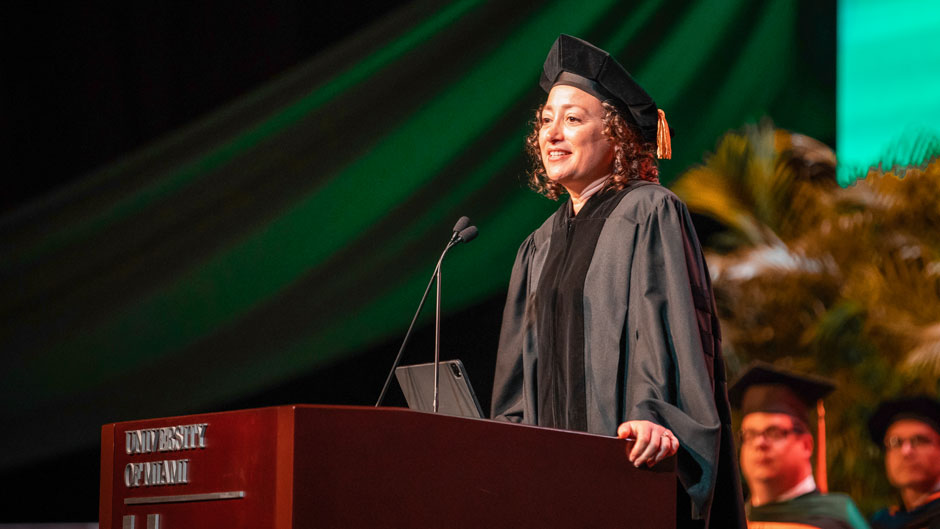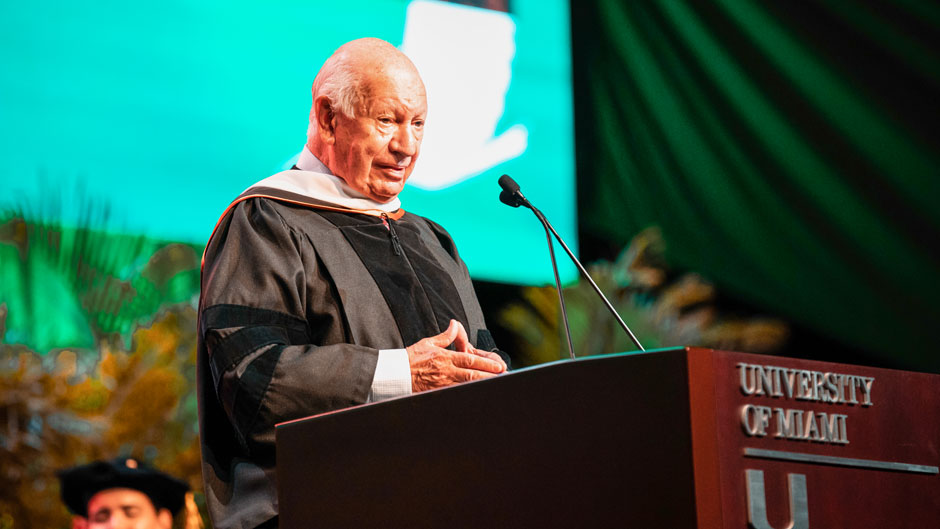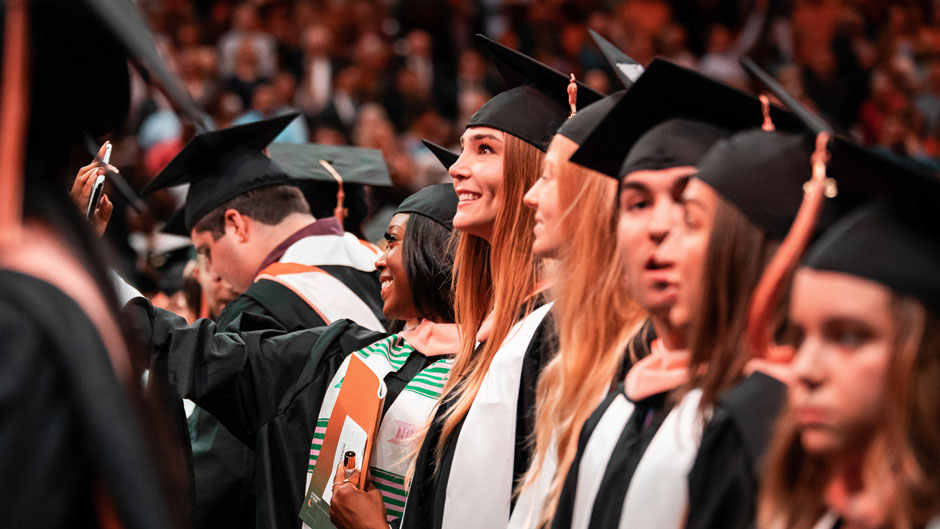More than 1,300 graduates—future journalists, business owners, engineers, nurses, architects, and marine scientists among them—crossed the Watsco Center’s stage on Thursday to receive their diplomas during the University of Miami graduate commencement ceremonies.
In two ceremonies that stretched through most of the day, graduates heard from two distinguished speakers: Ricardo Lagos, a lawyer and economist, who was president of Chile from 2000 to 2006, and Catherine Lhamon, who is currently serving a second term as assistant secretary for civil rights at the U.S. Department of Education.
In the second ceremony, Lhamon urged graduate students to practice “daily heroism and make the choice to stand for others and for equity.”
“We, each of us, have the capacity to safeguard our communities, to press for and secure the vision of the good that we hold most dear,” Lhamon said. “No matter what we do in our day jobs, we have the agency to impact our communities for the public good. I hope you use that agency both in the ways you plan in advance and in ways that you may not.”

Lhamon emphasized the unprecedented and remarkable times the students have overcome to earn their degrees—an achievement that demonstrates their capacity to meet and overcome what is hard and unplanned.
“We have all learned from the pandemic that the unplanned is more than possible,” she noted. “I hope you follow that lesson of everyday heroism, taking your gifts to build communities that sustain and stand for each other.”
The civil rights champion shared three anecdotes from her own career to demonstrate her message.
One of her first “clients” as a young lawyer was a class of third-graders whose school learning conditions were deplorable. Their parents’ complaints had been ignored for years. In addition to suing the school district, Lhamon put some of the students on the local TV station to tell their story. Within days, mobile classroom were installed, and the conditions improved.
The legal victory was sweet, she said, but the best was seeing the little girls’ faces beaming because their lawyer came for them.
“They were so proud that standing up for themselves had paid off, that the community listened, and had fixed the school conditions, Lhamon recounted. “The message that ‘I hear you, and I will stand for you’ was the resolution they needed.”
She cited, too, the example of a Black college football player who stood up for and befriended a white woman who had been raped by his white teammate. And, third, she spoke about her experience viewing an exhibit of iconic photographs from the civil rights movement.
The photographs—an elderly Black man held high by celebrants after he voted for the first time, a young girl who fearlessly turned her back on police to encourage other marchers to continue, among others—depicted people whose names we will never know but who acted on behalf of others.
“These were astonishingly courageous everyday heroes who stood up for what they believed to be right in order to make the progress we live today,” said Lhamon, who in 2016 was named by Politico as one of the 50 thinkers, doers, and visionaries transforming American politics.
“I hope that you find ways to communicate in your communities that you are there for them, sending the message that standing up for others is in itself valuable,” said Lhamon. “I wish for each of you that you hold on to the power of being there at the right moment when your presence communicates to someone that they are not alone.”
In the morning ceremony, Lagos told the graduates he was honored to be here.
During the 1980s, Lagos was a well-known opponent of the Chilean military dictatorship of Augusto Pinochet. In 1988, he shocked the nation when he openly denounced the dictator on live television. Pinochet was defeated in open elections.
Lagos said that he believed that the invitation to speak at the ceremony was a testament to how at a crucial moment in his country’s history, the citizens stood up to a dictator and voted him out of office and put him in place.
The former Chilian president highlighted several major challenges that awaited the graduates.
“I have to think of all of you in today’s world as we face the challenges of the lockdown of COVID-19,” Lagos said. “How are we going to build institutions to defeat the pandemic and lockdown and quarantine that we are growing used to?” he asked.
“We used to think that quarantines and lockdowns were the things of the Middle Ages, a long time ago,” he said. “But here we have a new challenge.”

According to Lagos, it was up to science to come up with answers beyond the current vaccines, since the virus has the capacity to mutate.
“We have to keep trying and many of you with your knowledge will know how to do it,” he said.
The second challenge is a more difficult one to face, he pointed out.
Lagos said that he was referring to the civilizational and the epochal change that left behind the industrial revolution, which was the framework in which the past 250 years of humans on this planet developed and the advent of the digital revolution, an age of algorithms and artificial intelligence.
While the industrial revolution brought mechanization and increased productivity, it also allowed humans to live longer and procreate in larger numbers. The increased populations have brought another challenge to the planet, he noted.
“So many human beings in this planet have depleted the planet and this is climate change arriving,” he said. “That is a major challenge that we have, not for ourselves but for our children and our children’s children.”
As the digital revolution emerges, he said, “you receiving the diplomas today are the new generation who will begin to answer what the digital age means.” As the new digital age grows and with the increased globalization in today’s world, new institutions will have to emerge to address “problems beyond our borders,” he added.
New political institutions will also emerge that will have to anticipate how politicians are governing before planned elections, Lagos explained.
Subjects like mathematics, biology, astronomy, and other disciplines will also change in this digital age and “you will be the first generation that will have to face” this, Lagos told the graduates. But he said that he was hopeful that the graduates were equipped with the knowledge and technology to find the answers to the challenges ahead. He also warned that as they ventured forth, new political institutions had to be developed that would ensure democratic processes to guarantee that all human beings are equal and treated with dignity.
“I am optimistic about human beings because you, the new generation, will have the right answers with new instruments for the first time and therefore you can fulfill the old dream—building a democratic system where all of us have to be equal in something,” he said.
President Julio Frenk bestowed the honorary Doctor of Humane Letters, honoris causa, on Lagos.
“Class of 2022 today we celebrate your achievements, which are the more remarkable considering all you have endured to get to this point,” said Frenk. ‘‘You have experienced a global crisis and changes on how you lived and learned, wore masks in classes, practiced social distancing, and made sacrifices for the sake of your education,” he added.
“Living through this experience while pursuing an advanced degree has given you the opportunity to learn and practice adaptability and resilience,” he said.
Student speaker Justin Houston, who received a master’s degree in public administration from the College of Arts and Sciences, echoed Frenk’s comments, reminding the students of their resiliency.
“We decided that in the midst of the pandemic—financial strain, disorder, chaos, and uncertainty—that this was the perfect time to pursue a graduate degree,” he said.
“We are all Hurricanes, but we are built a little differently from those that roll off the coast of Africa or form in any other body of water,” he continued. “You see, those storm systems need ideal conditions to thrive—the right season, a track unimpeded by land. A hurricane follows the path of least resistance,” he added.
“And if the environment is not perfect, the storm will avoid it at all costs. However, the Hurricanes here—Miami Hurricanes—are the exact opposite,” Houston emphasized. “We all thrive through adversity. The larger the obstacle, the stronger we become. Our storm track needs rigorous conditions.”

